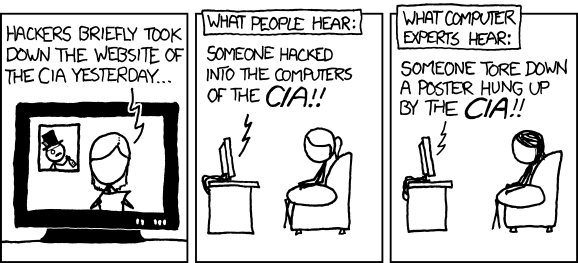Verhasselt: No Cyberwar Please

“xkcd” raises a point that cyberwar is better protected than many politicians, Gingrich included, would like to believe. http://xkcd.com/932/
February 2, 2012
In a recent interview with “Coffee & Markets,” a political website, presidential candidate Newt Gingrich made several claims in regards to acts of cyber-warfare against the United States. Gingrich argued that “we have to treat state-based overt activities as the equivalent of acts of war.” To which he argued many potential threats but made several mentions of cyber warfare specifically.
To fight back he proposed a simple solution: “I think this ought to be a very high level conversation at the presidential level as it relates, for example, to both China and to Russia. In saying, look there are games we’re not going to tolerate being played. And we either need an armed truce or we’re going to engage as aggressively as you are.” That’s a bold claim, that personally I don’t think the United States could ever follow up on in terms of a full-scale cyber-assault by any means.
War by definition is the “organized, armed and often a prolonged conflict that is carried on between states, nations or other parties typified by extreme aggression, social disruption and usually high mortality,” as defined by Wikipedia. Cyber-warfare is an attack, that much is certain, but does it constitute loading up the Navy’s 7th Fleet with Marines and parking them off of the coast of China? No, not at all.
This is an information game, one where covert tactics and espionage play a major role. The biggest problem at the moment is the United States is losing. As far as we know, we’ve been on the defense in these assaults and most private firms are scrambling to lock down their systems. This has sparked an interest by the media as well as politicians in terms of what needs to be done to stop attacks. The problem with this is that politicians don’t understand what needs to be done and the media blows any and all attacks out of proportion.
A recent “xkcd” web comic showed a picture of a TV news channel reporting that one of the CIA’s websites has been hacked. The next two frames it showed the reaction of “What average people hear: someone hacked into the computers of the CIA!” And “what computer experts hear: Someone tore down a poster hung up by the CIA!” And that’s the truth. Attack low priority systems all you want, the real meat is sealed up rather tight and harder to get to, or so we’d hope.
As far as meeting up with the other nations to discuss an armistice, we’d have to plead to being just as guilty to the offending nations in the battle for intelligence. The United States has played the part in several coups, assassinations and other nefarious political activity through the CIA and National Security Agency over the years that have literally gone one unaddressed. Think of how many people work for the various intelligence agencies in the United States and abroad. Those numbers are obviously classified, but you’ve got to assume that we have our own quickly-growing-in-size, cyber-assault group as well.
The idea of an intelligence armistice would create a huge gray area of what would be considered a cyber-attack and what would be an old fashioned James Bond-style intelligence operation.
So my advice to politicians is not to make claims that we can’t follow up on, especially seeing as how we just got done fighting one unnecessary war. We really don’t need to be fighting another war we don’t have the capabilities to win.






